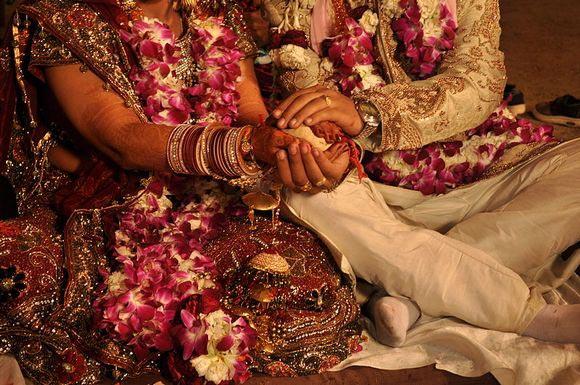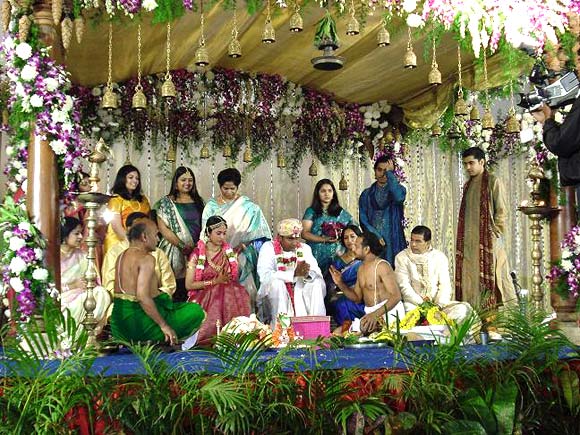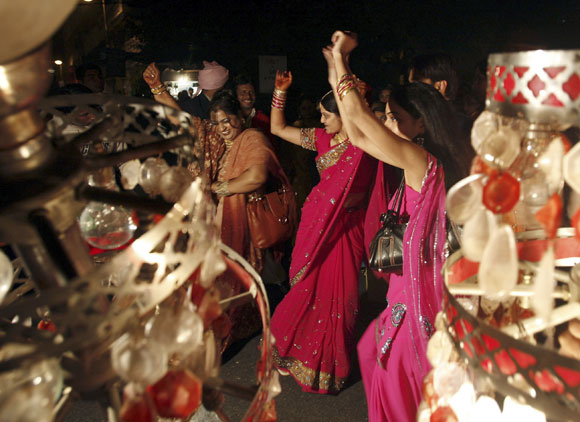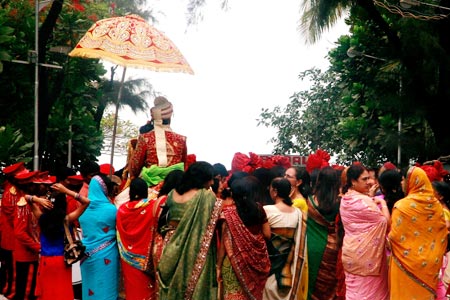 | « Back to article | Print this article |
When arranged marriages go WRONG
Give that horoscope compatibility a rest -- there are other credentials one must verify, warn youngsters who've had the arranged marriages backfire on them.
It's been over a year, but Vanitha Iyer, a 27-year-old bank executive from Erode, Tamil Nadu, hasn't bothered to collect her wedding album. And she probably never will.
She tells me that her marriage to a marketing executive in Chennai, which took place in April of 2011 is over, save for the pending legal annoucement.
When I try to confirm whether theirs was indeed an arranged marriage, Vanitha blurts out, "Yes, but who said arranged marriages are always successful?"
After a small pause, she continues, "There are exceptions. But even if the person is introduced to you by your family, you have to be careful and look beyond the obvious. It's a decision that will make or mar your life".
An MBA in finance, Vanitha was introduced to Murugesh through a close relative at a social function. The decision to marry each other had been mutual. Or at least that's what she thought.
Then, barely three months into the marriage, she was exposed to a whole bag of secrets that changed her life altogether.
Please click NEXT to continue reading...
Name changed to protect privacy
'His parents had emotionally blackmailed him into marrying me'
"When we got married in April, Murugesh (29) had lost his job and was serving a three-month notice period. He did not even bother to inform his family about this. The three-BHK apartment we were living in had to be sold because he had failed to pay the interest on his home loan," she recollects, before adding that Murugesh managed to convince everyone that he had taken extended leave from work for his marriage and honeymoon.
Whenever Murugesh got angry or irritated, Vanitha assumed it was because of his career crisis and even convinced him to allow her to work, much against the will of his parents, so that he could be at peace.
"Once, when I came home from work early, I caught him chatting with a girl on the Internet. He said it was an ex-colleague who was helping him find a job. A few months later, his parents told me that she was his ex-girlfriend, with whom he'd broken up because they refused to accept her."
In February this year, Murugesh requested Vanitha to file for divorce because he wanted to get back with his ex. That's when reality hit her.
"Murugesh told me that his parents had emotionally blackmailed him into marrying me -- a girl of his own caste," explains Vanitha.
She filed for divorce in March, and although she is happy that her family and friends have supported her throughout, she advises friends to be cautious and probe for warning signs before finalising the decision to marry.
"Don't rely on your parents to run a background check for you," she counsels.
Why do Indian parents continue to arrange marriages?
In January 2012, during her visit to India, talkshow host Oprah Winfrey famously remarked: "How can anyone arrange marriage for you? I don't understand."
Now, in a country where 90 per cent of marriages are, according to UNICEF, arranged by parents and/or relatives, Winfrey's statement was taken with a pinch of salt and ignored in good humour.
Rohan Manghnani, business head of leading matrimony site Jeevansaathi.com, confirms that arranged marriages are popular in the country because they are "reliable and socially acceptable".
But Manghnani also sounds a warning about the risks involved in a set-up.
"Earlier, people lived in joint families. So in a given village, everyone knew each other. Till the late '80s, most marriages used to take place through the referral system, where a common family member would arrange for the bride and groom to meet. This family member was trusted to take responsibility for the bride and groom."
However, with an increase in nuclear families, the tradition of arranging a prospective partner came to be fulfilled by online agencies like Shaadi.com, BharatMatrimony and JeevanSaathi, to name a few.
'You don't know who you can trust'
As the demand for online matrimonials picked up, the risks inflated. Today, it is not uncommon to hear youngsters complain that a certain candidate's online profile is far from the reality.
Shradha Choudhary, a 26-year-old media planning executive from Mumbai shares one of the worst experiences she's had.
"This guy I met through a leading matrimony site told me that he had never been in a relationship and that he was a casual drinker. A few months after we started dating each other, I realised that he not only drank every alternate day, but was not serious about marriage. He said he'd found my profile interesting because I was a media executive. To date, I don't know what he meant by that."
After a few unpleasant experiences, Shradha passed on the responsibility of finding a life partner to her father, who now controls her profile online.
"The numbers of requests have come down since my father took over. But at least the few I've met since then have been genuinely interested in marriage," she says.
Shradha goes on to warn youngsters about dealing with strangers they meet through matrimony websites. "Keep an eye on his/her friends, and how s/he behaves in public. If you find any discrepancies in the way s/he treats you or the way s/he behaves, and that makes you uncomfortable, do not hesitate to tell your parents about it." She also strictly advises against sharing personal details like e-mail passwords and discussing past relationships in the initial conversations.
"Parental involvement adds credibility to the search," observes Manghnani. "It also calls for a reality check. And if parents did not get involved, every matrimony site would have turned into a dating one."
Like Shradha, most youngsters are rather convinced of involving their parents.
"When someone from the family is involved, people tend to fake less. The person you are dealing with -- usually a total stranger -- will not take you for a ride. This is very important, because you don't know who you can trust," shares Viveka Shetty, 32, who waited for three years to settle for the right guy from the same community as hers.
The ability to see what lies beneath
Often, first impressions are far from reality. That's one reason why people tend to reconsider decisions after one or two meetings.
"These days, youngsters have certain expectations from their partners-to-be. Sometimes what they write online or tell their parents is not true," says Parvathy Sasidharan, a housewife and part-time marriage counsellor from Mumbai.
"Every man today wants his partner to be educated and have a good job. But sometimes parents include a clause that the girl has to be ready to quit her job and look after the family and kids. This may not be the groom's expectation, but even trivial things like this have to be discussed between families and sorted out before marriage," reasons Sasidharan. "After all, marriage is a lifelong association between two families and not two individuals alone."
Manghnani could not agree more. "We find candidates who on their profiles mention that they want a working partner, but end up rejecting every female candidate who has a job. We have realised that matching one's interests with another's is a subconscious process and if you are able to identify what those interests are at an early stage, that can help you choose the right partner," he suggests. He also advises youngsters to be honest about their interests and intentions during the whole process.
Illustration: Uttam Ghosh
'Compatibility is a major factor that we all ignore in arranged marriages'
Sasidharan explains that even checks by matrimony portals are not always foolproof and advocates caution.
"Parents must not rely on matrimony agencies and agents completely. You have to understand that it's a business for them." She says compatibility is a major factor that we all ignore in arranged marriages. "Parents must invest time and resources in knowing more about their prospective sons/daughters-in-law -- their likes, dislikes, priorities, views about family planning, expectations of social behaviour etc."
Anand Kumar Mandal, a resident of Midnapore and father of three daughters jokes about how he played detective to find out more about his elder son-in-law.
"The matrimony agent told me that the prospective groom was based in Mumbai. Although he convinced me that he had a good profile, I wanted to ensure that for myself. I had never been to Mumbai, but since it was a question of my daughter's future, I took a train there and went to his office posing as a life insurance agent. Although I approached him as a marketing executive, he considered my seniority and treated me well. He charmed me at the very first meeting."
Mandal, who is now searching for a groom for his youngest daughter, advises parents to investigate details like job profile, salary, financial status and talk to neighbours before arriving at a decision.
"Friends and family members will only tell you about the positives of the prospective bride or groom. Talking to their neighbours and colleagues will give you a much better perspective."
Illustration: Uttam Ghosh
What youngsters must do
- Verify details of educational qualification and profession.
- Verify financial status for pending loans and legal notices.
- Verify current marital status and statuses of past relationships, if any. If you are considering a divorcee, ensure that the person in question is lawfully divorced.
- Be honest about your intentions of marriage. If you are uncertain about the partner, or decision to marry, speak up.
- Know your priorities. Be honest about your interests and expectations, eg: whether you want your partner to be a housewife, a working professional, your preference of a joint/nuclear family etc.
- Interact with parents and siblings of your prospective partner to better understand their expectations and influence in the decision-making process.
- Check their profiles on Facebook, LinkedIn and other social networking sites for public behaviour and attributes.
- Inform your family of any new developments or discrepancies in behaviour or expectations.
- Have realistic expectations -- if you've studied till Class XII, for instance, and want an MBA bride, that may be difficult. You may have to compromise at some stage.
- Marriage, besides the meeting of two families, also celebrates the compatibility between two individuals. Prioritise your choices and take a wise decision.






